High-Level Policy Session 1 : Bridging Digital Divides
WSIS
Session 136
According to the latest ITU data, roughly one-third of the global population (2.7 billion people) remain unconnected to the Internet. The figure was an improvement from 2021 but revealed a levelling off from the strong connectivity gains made during the onset and height of the COVID-19 pandemic.
The Internet has become more affordable in all regions of the world and among all income groups. Cost, however, remains a major obstacle to Internet access, especially in low-income economies. The current global economic situation – with high inflation, rising interest rates, and deep uncertainty – could add to the challenge of extending Internet reach in lower-income areas.
Furthermore, the gender gap is still present, with 259 million fewer women having access to the internet than men. Although the world has moved closer to gender parity in the last three years, gender parity scores are low in underdeveloped and vulnerable economies.
We are fully aware that the benefits of the information technology revolution are today unevenly distributed between developed and developing countries and within societies. We are fully committed to turning this digital divide into a digital opportunity for all, particularly for those who risk being left behind and being further marginalized.
[1]//1f8a81b9b0707b63-19211.webchannel-proxy.scarabresearch.com/en/mediacentre/Pages/PR-2022-11-30-Facts-Figures-2022.aspx
[2]//1f8a81b9b0707b63-19211.webchannel-proxy.scarabresearch.com/net/wsis/docs/geneva/official/dop.html
First Phase of the WSIS (10-12 December 2003, Geneva) Geneva Declaration of Principles
ICTs and Gender Mainstreaming
Information and Communication Technologies (ICTs) are tools through which gender equality and women's empowerment can be advanced and are integral to the creation of societies in which both women and men can substantively contribute and participate.[1]
The WSIS Forum had launched a 50/50 gender balance challenge in the wake of call for realising equal participation at the WSIS Forum. The WSIS Stakeholders are all invited to mainstream a gender equality perspective and use ICTs to accelerate progress towards gender equality.
This year, the WSIS Forum 2023 will feature ICTs and Gender Mainstreaming track, comprises interactive sessions with different topics covering gender and ICTs issues. This effort is also part as an initiative inaddressing the gender gap in ICT that aligns with SDG Goal 5 “Achieve gender equality and empower all women and girls”. The cross-cutting commitments on gender equality are further echoed across all WSIS Action Lines.
[1] Women's Empowerment in the Digital Age: Implementing WSIS Outcomes and Agenda 2030
//1f8a81b9b0707b63-19211.webchannel-proxy.scarabresearch.com/en/action/gender-equality/Documents/WSIS-Women-Empowerment-
Background.pdf)

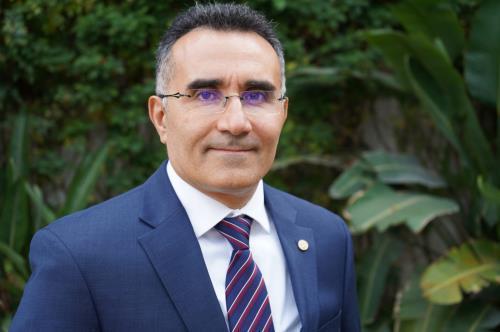
Tunisian born, Dr. Bilel Jamoussi is Chief of the Study Groups Department of ITU Standardization Bureau in Geneva Switzerland. Since 2010, he has been leading the bureau’s standards making activities into a new era characterized by rapid convergence and the need for increased collaboration with vertical sectors and partnership between developed and developing countries. Prior to 2010, Jamoussi worked for a Telecommunication equipment and solutions provider for 15 years in Canada and then in the United States where he held several leadership positions and was granted 22 US patents in diverse areas including packet, optical, wireless, and quality of service. He holds a BSc, MSc and PhD degrees in Computer Engineering from the Pennsylvania State University, USA. He is fluent in Arabic, French, and English and speaks some Spanish and German
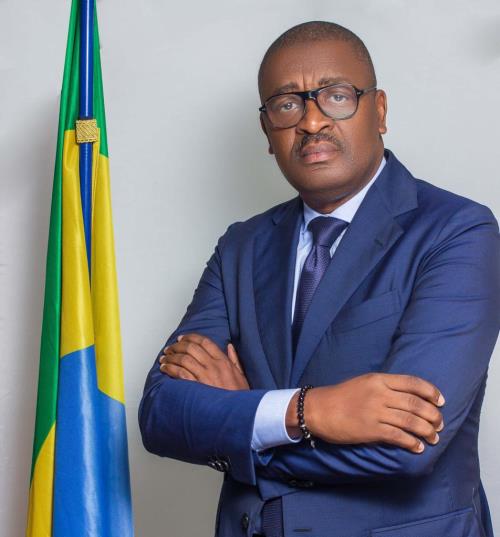
Monsieur Jean Pierre DOUKAGA KASSA est né le 24 juillet 1968 à Tchibanga au Sud du Gabon.
Il est Inspecteur Central du Trésor, diplômé de l’Ecole du Trésor de Noisiel en France, promotion Marie Curie 1994. Il est titulaire d’une Maîtrise en Finance Privée de l’Institut de Gestion, Université Omar BONGO à Libreville et d’un MBA en Finance de l’Université de Québec à Montréal et a été chargé de cours de gestion financière des collectivités locales à l’Institut de l’Economie des finances à Libreville.
Monsieur Jean Pierre DOUKAGA KASSA a occupé plusieurs fonctions dans son corps de métiers :
-Trésorier de l’Assemblée Nationale
-Directeur de la dette Viagère
-Trésorier Provincial du haut-Ogooué
Enfin, avant son entrée au Gouvernement, Monsieur Jean Pierre DOUKAGA KASSA était député du 1er arrondissement de Tchibanga à l’Assemblée Nationale et Député membre de la Commission des finances au Parlement Panafricain en Afrique du Sud.
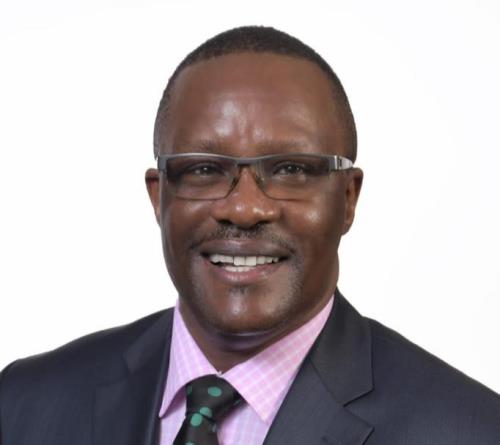
Eliud O. Owalo is the Cabinet Secretary, Ministry of Information, Communication and the Digital Economy in Kenya. He worked as an Economist, Management Consultant and Strategy Expert between 2001 - 2022. Until his appointment as CS, Mr. Owalo was a practicing Managing Consultant at Eliud & Associates (E&A) Management Consultants, an International Management Consultancy and Training firm. He holds a BA Degree in Economics and Business Studies from Kenyatta University, an MBA Degree in Human Resource Management from the University of Nairobi and is currently a Doctor of Philosophy (PhD) Candidate in Strategic Management at the University of Nairobi. He is a Fellow of the Institute of Human Resource Management (FIHRM); Member of the Professional Trainers’ Association of Kenya (PTAK); and a former Director/Council Member of the Kenya School of Government (KSG). His lead consultancy assignments in both the Public and Private Sectors have focused mainly on Macro and Micro-Economics; Strategic Planning; Business Planning; Organizational Re-structuring; Job Evaluation and Pay Structure Architecture; Performance Management; Management of Strategic Change; Training Needs Assessment (T.N.A.); Organizational Design/Development; Executive Search, Selection and Placement (Recruitment); Human Resource Audit; Market Research/Surveys; and Feasibility Studies.

The Honorable Warren Kwame Eusi Mc Coy was appointed to a ministerial portfolio in the Cabinet of His Excellency, President Mohammed Irfaan Ali on August 5th, 2020, and to a seat in the 12thParliament of Guyana, following the electoral victory of the Peoples Progressive Party-Civic at the March 2nd General and Regional Elections.
Minister Mc Coy, who holds responsibility for Public Affairs, and who’s functions are embedded within the Office of the Prime Minister, brings to the portfolio a wealth of experience in media, strategic communication management, and executive administration; having accumulated more than two decades of professional industry experience.
Mc Coy started his career in broadcast journalism with the Guyana Broadcasting Corporation in 1993, and later moved on to serve as an Information Officer with the Ministry of Information between 1998 and 2001. He would spend another six years honing public relations skills with the Ministry of Health, before being elevated to the prominent senior role of Communication Coordinator/Press Officer within the Office of the President, where he served with distinction until the change of government in 2015.
During the years prior to the reelection of the People’s Progressive Party-Civic to government in 2020, Mc Coy administered the communication and coordination portfolios in his role as Executive Assistant to the then Leader of the Opposition, former President and now Vice President, His Excellency Bharat Jagdeo.

She has a degree in Communication Sciences from the University of Buenos Aires (UBA), with a postgraduate degree in Design and Evaluation of Public Policies (Pompeu Fabra University). She is also a researcher and teacher.
She coordinated the postgraduate courses “ICT: Internet, policies and society'' (National University of Tres de Febrero) and "Digital platforms and interconnected society" (National University of Avellaneda). She also directed the Workshop on Digital and Political Communication Strategies of the Master's Degree in Political and Institutional Communication of the Ortega y Gasset University Research Institute (Complutense University of Madrid).
In addition, she was in charge of the project on digital signature and digital management of judicial files in the Secretariat of Innovation of the Council of the Magistracy of the City of Buenos Aires, where she also directed the training team of the General Directorate of Informatics and Technology.
In the private sector, she was in charge of the Communication and Development area of the i-ciudad Public Policy Institute and the Intercargo handling company.
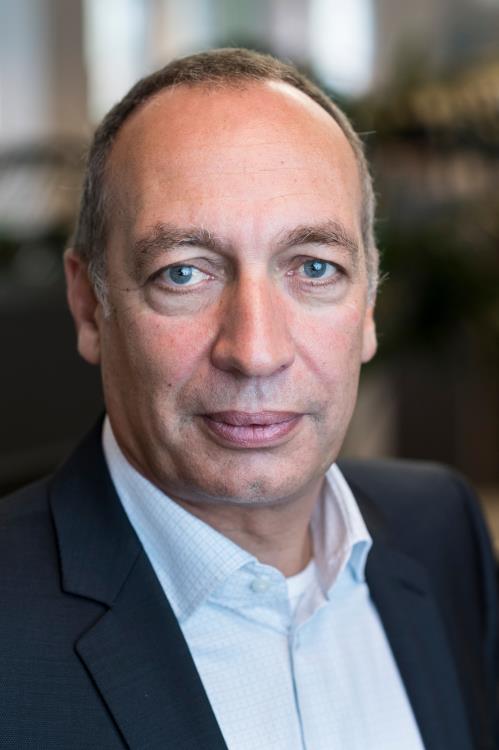
Bernard Maissen has been Director of the Federal Office of Communications (OFCOM) since July 1, 2020. Before that, he headed the media department at OFCOM for a good two years as Vice Director.
The Rhaeto-Romanic Bernard Maissen studied German, history and journalism at the University of Freiburg and then worked in various functions as a journalist and editor-in-chief. Before moving to OFCOM, he was editor-in-chief and member of the management of the Swiss dispatch agency (sda) for 12 years.
He worked for several years on the board of the international agency network MINDS International, was a member of the program commission of the Swiss School of Journalism (MAZ) in Lucerne and was a member of the Swiss Federal Media Commission (EMEK) from 2013 until he joined OFCOM.
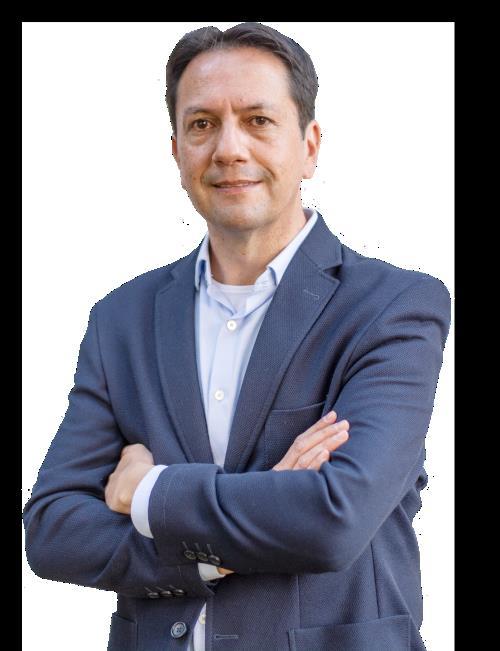
He is an electronic engineer from the Pontificia Javeriana University, with a Master's Degree in Business Administration and Management and a Specialization in Marketing Management from the Rosario University.
In his professional career, he served as advisor and Director of the Communications Industry of the Ministry of Information and Communication Technologies (MINTIC), as well as advisor and coordinator of the Industry Knowledge Center, of the Coordination of Postal Regulation and of the Coordination of Infrastructure Regulation of the CRC. He also worked for organizations such as the United Nations Development Program (UNDP) and the Organization of Ibero-American States (OEI).
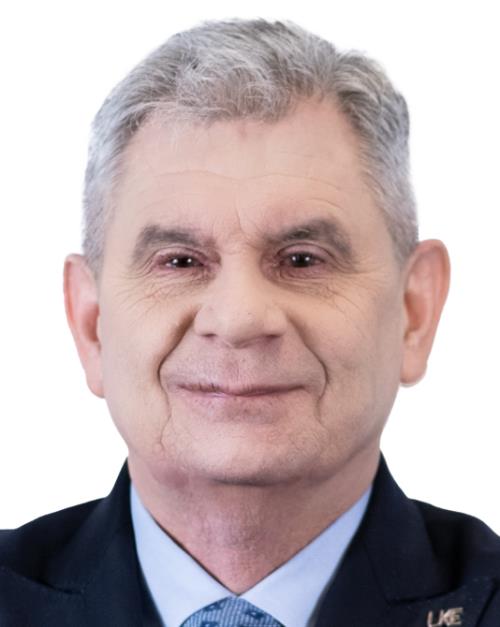
Scientist and manager with many years of experience. Associated with Wrocław University of Science and Technology and Wroclaw Centre for Networking and Supercomputing. Author of numerous scientific publications.
His professional interests are focused on technical, business and legal aspects of telecommunication services and data communication networks, as well as on the development of Internet, the convergence of telecommunications, information technology and media and the problems of information society.
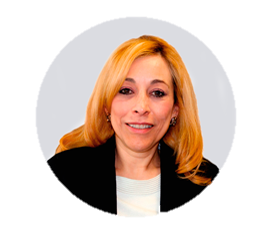
She has been Head of the IFT's Studies Center since August 2019. Her work career includes various positions at the Federal Competition Commission, where she served as General Director of Regulation and Privatization, General Director of International Affairs and Deputy General Director of Economic Studies, among others.
In 2013 and 2016 she was a candidate for Commissioner of the IFT and Federal Economic Competition Commission (COFECE, for its acronym in Spanish).
She is an expert on competition, telecommunications and digital markets and has published articles in national and international journals. She has taught courses on economic competition and industrial organization at Universidad Panamericana, Universidad Nacional Autónoma de México (UNAM) and Instituto Tecnológico Autónomo de México (ITAM).
She holds a Master's degree in Public Policy (ITAM), a postgraduate degree in Business Administration from the Catholic University of Leuven (Belgium), and a Bachelor's degree in Economics from ITAM. She joined the IFT in 2015 as an Investigator in Economic Competition.

Phyliss Ferrell has been with Lilly for more than 25 years and has held many leadership roles throughout the organization. She has led efforts in medical affairs, medical development, commercial capabilities, sales, marketing, recruiting, business development, strategy, transformation, Six Sigma, and corporate financial planning.
Ferrell received a Bachelor of Arts degree in economics and management with minors in computational mathematics and Asian studies from DePauw University. She graduated Phi Beta Kappa and with Magna Cum Laude honors in 1994. She received an MBA in general management and a certificate in public management from the Stanford University Graduate School of Business in 2001 and graduated with both Arjay Miller Scholar honors and as the Arbuckle Award recipient.
Phyllis was recognized with the Rising Star Award from the Healthcare Businesswomen’s Association and the Indianapolis Star Top 40 Under 40. Phyllis is a current member of the World Dementia Council, a steering committee member of the Milken Institute Center for Aging Alliance for Dementia Care and NMQF Alzheimer’s Disease Index working groups, and a strategic reviewer for the Alzheimer’s Disease Drug Discovery Foundation Diagnostics Accelerator. She is also a member of the Indiana Chapter of the Healthcare Businesswomen’s Association; on the Boards of Directors for Alzheimer’s Research UK EDoN, Gates Ventures Alzheimer’s Disease Data Initiative, the Indiana Chapter of the Alzheimer’s Association, Stanford Associate Board of Governors, Indianapolis 500 Festival, and the Lebanon Area Boys & Girls Club. Phyllis is a founding member of Women Against Alzheimer’s and Women of Impact Boone County; co-chair of the Women’s Leadership Council; the alumna sponsor of the Women in Economics and Business Program at DePauw University; a member of the Washington C. DePauw

Caroline Wamala-Larsson is Associate Professor of Gender Studies and is currently Director for the Swedish Program for ICT in Developing Regions (SPIDER), which is a centre of enablement, at Stockholm University.
Her research looks at the relationship between the construction of gender and technology with a strong inclination towards marginalised communities such as informal workers.
Caroline is passionate about digital media and gender which is where her publications are focused. She is currently leading 2 work packages in 2 separate EU-Horizon funded projects.
With EQUALS-EU funded by HORIZON20 (Science with and for Society) she is leading Work Package 1 that has as its focus on appraising the state of the art of gender inclusive social innovations in 22 countries.
Her recent publications include:
- Chiwona-Karltun, L., Amuakwa-Mensah, F., Wamala-Larsson, C., Amuakwa-Mensah, S., Hatab, A. A., Made, N., … Bizoza, A. R. (2021). COVID-19: From health crises to food security anxiety and policy implications. Ambio, 50(4), 794–811.
- Wamala-Larsson, Caroline and Stark Laura (2019) Gendered power and mobile technology: Intersections in the global South. Routledge
- Wamala-Larsson, C & J. Svensson. (2018). Mobile Phones in the Transformation of the Informal Economy: Stories from market women in Kampala. Journal of Eastern African Studies
- Beasley, Christine, Mary Holmes, Katherine Harrison, and Caroline Wamala Larsson. "Innovations in intimacy: Internet dating in an international frame." In Rikke Andreassen, Michael Nebeling Petersen,Katherine Harrison, Tobias Raun (eds.) (2017) Mediated Intimacies, Connectivities, Relationalities and Proximities pp. 89-102. Routledge.
- Svensson, J. & Wamala – Larsson, C. (2016). Situated Empowerment: Mobile Phones Practices among market women in Kampala. Mobile Media & Communications. DOI: 10.1177/2050157915619212
- Wamala-Larsson, Caroline and Scharff, Christelle and Hellström, Johan. (2015). Mobile Participation: Access, Interaction and Practices. Cambridge Scholars Publishing.
-
 C1. The role of governments and all stakeholders in the promotion of ICTs for development
C1. The role of governments and all stakeholders in the promotion of ICTs for development
-
 C2. Information and communication infrastructure
C2. Information and communication infrastructure
-
 C3. Access to information and knowledge
C3. Access to information and knowledge
-
 C4. Capacity building
C4. Capacity building
-
 C5. Building confidence and security in use of ICTs
C5. Building confidence and security in use of ICTs
-
 C6. Enabling environment
C6. Enabling environment
-
 C7. ICT applications: benefits in all aspects of life — E-government
C7. ICT applications: benefits in all aspects of life — E-government
-
 C7. ICT applications: benefits in all aspects of life — E-business
C7. ICT applications: benefits in all aspects of life — E-business
-
 C7. ICT applications: benefits in all aspects of life — E-learning
C7. ICT applications: benefits in all aspects of life — E-learning
-
 C7. ICT applications: benefits in all aspects of life — E-health
C7. ICT applications: benefits in all aspects of life — E-health
-
 C7. ICT applications: benefits in all aspects of life — E-employment
C7. ICT applications: benefits in all aspects of life — E-employment
-
 C7. ICT applications: benefits in all aspects of life — E-environment
C7. ICT applications: benefits in all aspects of life — E-environment
-
 C7. ICT applications: benefits in all aspects of life — E-agriculture
C7. ICT applications: benefits in all aspects of life — E-agriculture
-
 C7. ICT applications: benefits in all aspects of life — E-science
C7. ICT applications: benefits in all aspects of life — E-science
-
 C8. Cultural diversity and identity, linguistic diversity and local content
C8. Cultural diversity and identity, linguistic diversity and local content
-
 C9. Media
C9. Media
-
 C10. Ethical dimensions of the Information Society
C10. Ethical dimensions of the Information Society
-
 C11. International and regional cooperation
C11. International and regional cooperation
-
 Goal 1: End poverty in all its forms everywhere
Goal 1: End poverty in all its forms everywhere
-
 Goal 2: End hunger, achieve food security and improved nutrition and promote sustainable agriculture
Goal 2: End hunger, achieve food security and improved nutrition and promote sustainable agriculture
-
 Goal 3: Ensure healthy lives and promote well-being for all
Goal 3: Ensure healthy lives and promote well-being for all
-
 Goal 4: Ensure inclusive and equitable quality education and promote lifelong learning opportunities for all
Goal 4: Ensure inclusive and equitable quality education and promote lifelong learning opportunities for all
-
 Goal 5: Achieve gender equality and empower all women and girls
Goal 5: Achieve gender equality and empower all women and girls
-
 Goal 6: Ensure access to water and sanitation for all
Goal 6: Ensure access to water and sanitation for all
-
 Goal 7: Ensure access to affordable, reliable, sustainable and modern energy for all
Goal 7: Ensure access to affordable, reliable, sustainable and modern energy for all
-
 Goal 8: Promote inclusive and sustainable economic growth, employment and decent work for all
Goal 8: Promote inclusive and sustainable economic growth, employment and decent work for all
-
 Goal 9: Build resilient infrastructure, promote sustainable industrialization and foster innovation
Goal 9: Build resilient infrastructure, promote sustainable industrialization and foster innovation
-
 Goal 10: Reduce inequality within and among countries
Goal 10: Reduce inequality within and among countries
-
 Goal 11: Make cities inclusive, safe, resilient and sustainable
Goal 11: Make cities inclusive, safe, resilient and sustainable
-
 Goal 12: Ensure sustainable consumption and production patterns
Goal 12: Ensure sustainable consumption and production patterns
-
 Goal 13: Take urgent action to combat climate change and its impacts
Goal 13: Take urgent action to combat climate change and its impacts
-
 Goal 14: Conserve and sustainably use the oceans, seas and marine resources
Goal 14: Conserve and sustainably use the oceans, seas and marine resources
-
 Goal 15: Sustainably manage forests, combat desertification, halt and reverse land degradation, halt biodiversity loss
Goal 15: Sustainably manage forests, combat desertification, halt and reverse land degradation, halt biodiversity loss
-
 Goal 16: Promote just, peaceful and inclusive societies
Goal 16: Promote just, peaceful and inclusive societies
-
 Goal 17: Revitalize the global partnership for sustainable development
Goal 17: Revitalize the global partnership for sustainable development